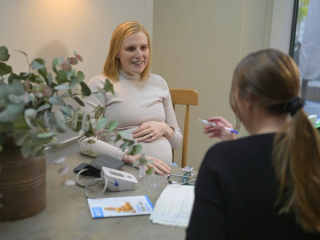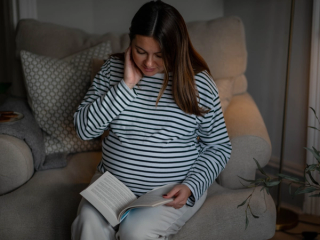
- Home
- Advice And Support
- Pregnancy
- Pregnancy Tips & Support
- How To Stay Bonded With Your Partner During Pregnancy
How to stay bonded with your partner during pregnancy
With all the preparations taking place for the arrival of your little one, it’s understandable if your relationship takes a back seat. Elinor, our relationship therapist, shares her top tips for how to stay bonded with your partner throughout pregnancy.
Pregnancy can be one of the most exciting but tiring times, as you prepare for the arrival of your special little one. Painting a nursery, washing baby grows, choosing a pram, not to mention a heavy dose of pregnancy hormones and a growing bump…all this means that parents-to-be are often exhausted before their baby even arrives. And when you’re preoccupied with preparations, it’s understandable if your relationship takes a back seat.
However, many people also find pregnancy to be a time of worry, full of change – a time when you need your partner more than ever. It can be hard to feel that closeness if your relationship hasn’t been much of a priority.
The good news is there is lots you can do to make small but helpful adjustments to help the two of you stay connected and strengthen your bond.
1. Check in with your partner
It seems so obvious but when we are so busy talking about baby and the future, we can forget to stop and simply ask “how are you feeling?”. Your partner might be feeling pressured to be happy and excited, and they could be ashamed of mixed feelings or anxiety. Asking your partner how they are doing is key in showing that you care, and that all their feelings are valid and important.
2. Time together
When you move from a ‘two’ to a ‘three’, it is a big shift, and it can be hard to have quality couple time at first. So, before your baby arrives, why don’t you try to make a weekly date to allow you to connect and enjoy your time together? It doesn’t have to be a big splashy evening out. You could pop out for a walk somewhere new, or try cooking something different in the kitchen together. There are plenty of online and in person classes you could try together: pottery, massage, salsa… the options are endless. Take turns to organise something fun and have a laugh.
3. Touching time
When your hormones are going haywire and your body is changing, it can really have an impact on how much intimacy you want. Some people notice an increase in their desire, whereas others don’t want as much sexual touch as before. The key here is in good communication, letting your partner know what you want, and also what you don’t want. Try the ‘Three Minute Game’ where you each ask each other: where would you like me to touch you for three minutes? Where would you like to touch me for three minutes? This game helps open you up to new types of sensuality, reconnecting with curiosity and play, and decreasing any pressure or expectation around intimacy.
4. Asking for help
It’s normal that pregnancy can feel like a daunting time. This can be especially true if you’ve experienced fertility difficulties or pregnancy loss. There is often a lot of expectation to be excited about baby arriving, but many people worry about whether they will be a ‘good’ parent, or are anxious about the financial impact of having kids. Whatever your worries are, you won’t be the only person feeling this way and being open and honest with your partner can help. Your partner isn’t a mind reader though, so try to tell them when you’re struggling or in need of a hug, as they might not know unless you let them in.
5. Showing appreciation
When things are busy, we can overlook telling our partner what they mean to us. However, taking the time to share kind, fond words can make a huge difference to the quality of our relationship. It doesn’t have to be anything big, but saying something like “I really appreciated it when you…” or “it felt really good when you…” can help them feel noticed and cared for. Sharing positive affectionate words is known to be one of the best predictors of relationship success, so why not start today and send your partner a loving text to make them smile.
As you can see, there is plenty of small but important shifts that you can make to help your relationship during this period of change. Often making improvements is just a matter of forming new habits, so don't worry if you need to practice them a few times before they feel normal.
Further support
It’s also important to note that although it's very common to feel you're on an emotional rollercoaster when you're expecting a baby, it's also good to know where you can seek help if you're struggling. Signs that you might need some extra help could be finding it hard to sleep because you're worrying, feeling tearful, feeling low, or having suicidal thoughts. The NHS Every Mind Matters website has plenty of good information and top tips about mental health.
One of your first routes for help can be your GP who can support and link you in with NHS psychological therapies, who offer evidence based therapy and online support to address a range of common mental health difficulties. You can also self refer hereto your local NHS talking therapies service if you prefer not to speak to your GP for whatever reason.
You could reach out the charity PANDAS who support parents and partners who are experiencing prenatal or postnatal depression symptoms, and who have a range of support options available including a helpline, email support and groups.
You might also wish to consider seeking some counselling support by searching on the BACP or NCS websites for a qualified therapist in your area, or feel free to contact me at my websiteif you’re looking for some relationship therapy and advice.
Good luck! I’m looking forward to being alongside you the next stage of your parenting journey.
- Elinor
Advice & tips

Want to read more? Join the HiPP BabyClub for full access to this article.
As a BabyClub member, you'll get access to a range of exclusive benefits, including:
Monthly competitions
Discounts from our Partners
Expert advice tailored to your little one's age
Weaning recipes
HiPP shop discounts*
*10% off HiPP's online shop does not apply to our First Infant, Anti-Reflux or Comfort Formula Milk.
Important notice: Breastfeeding is best. Follow on milk should only be used as part of a mixed diet from 6 months. Talk to a healthcare professional.













